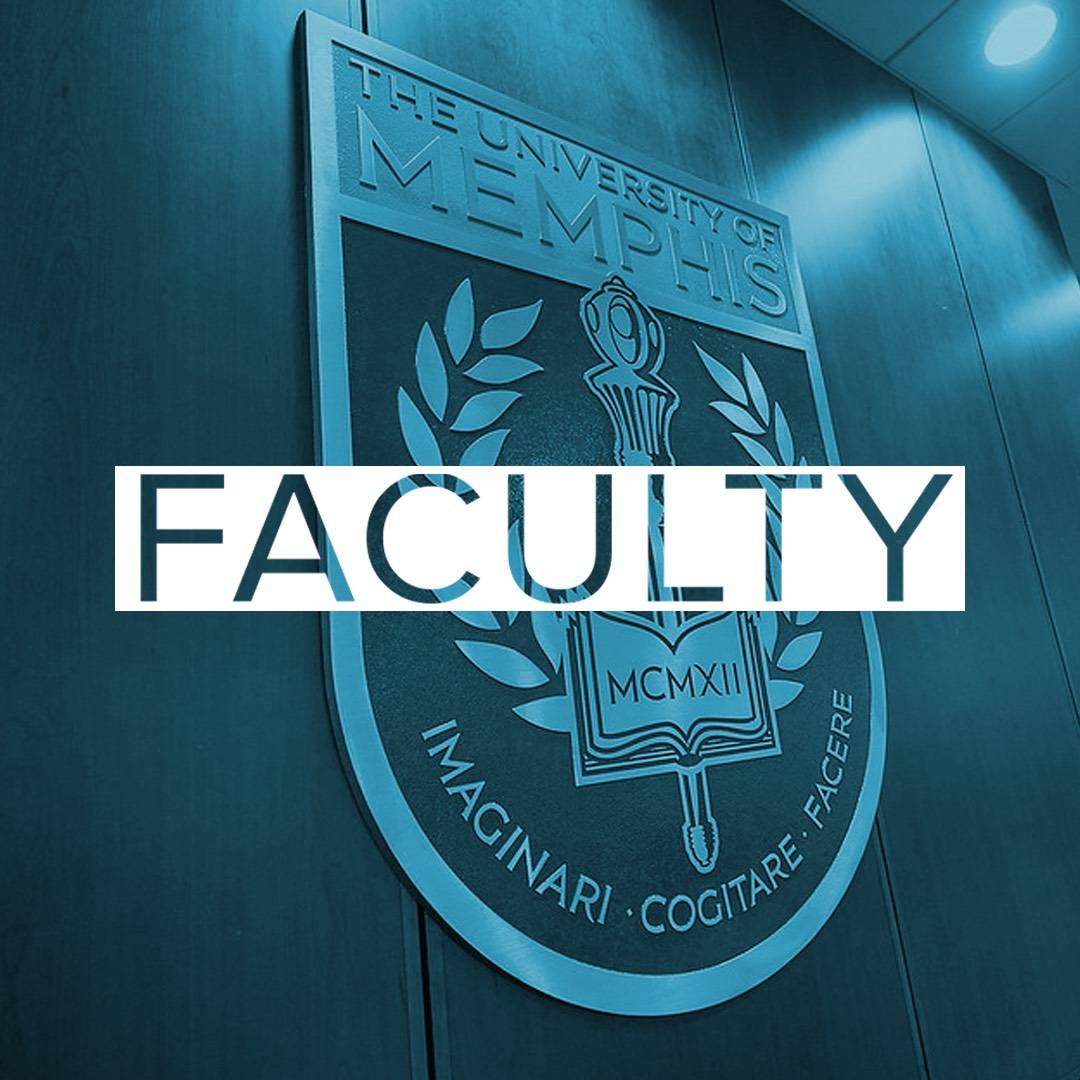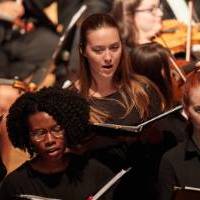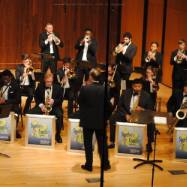
Inspire a love of music within students as you shape future artists as a music educator.
Train to teach from the moment you step on campus. Our well-respected music education curriculum at Rudi E. Scheidt School of Music is based on musicianship, teaching and research and is taught by the finest faculty in the field.
Blending cutting-edge research insights and practical teaching techniques, students are encouraged to seek, evaluate, and appropriately implement proven strategies and innovations in music teaching and learning. Our NASM-accredited program offers a variety of teaching techniques, learning structures, and academic environments that prepare you to earn licensure to teach elementary and secondary music in the areas of choral, instrumental/ band, or general music.
The School of Music enjoys partnerships with the University of Memphis's University Schools network, municipal school districts throughout the region, and Memphis-Shelby County Schools, Tennessee’s largest school district, to provide hands-on field experiences (preschool through secondary level) and a year-long residency (student teaching) internship.
You will enjoy state-of-the-art music facilities and work with a large and diverse community of faculty, students, and industry professionals. You’ll have the opportunity to attend numerous concerts, clinics, and master classes given by students, faculty, and visiting artists that will broaden your experience. Additionally, the University’s location allows limitless opportunities to plug into a vibrant music city.
Admission + Audition Requirements
Visit this website for more information.
What degrees do we offer?
For students planning to pursue careers as music teachers or choral directors in elementary and secondary schools, this degree provides the pedagogical and musical training necessary for effective careers in education. Our Music Education - Choral degree program will blend theory and instruction with hands-on, immersive practices. Students develop their creative talents while they learn how to educate the next generation.
This degree program for aspiring choral educators includes an intensive, skill-oriented curriculum that empowers you to combine your passion with purpose. You’ll explore advanced choral and voice techniques, examine the latest in music and classroom technology, learn how to use assessment strategies and dive into educational psychology theories
The program meets the Tennessee Department of Education’s K-12 music education certification requirements.
Scholarships are available.
Outcomes:
- Music education students will demonstrate their commitment to teaching music in our diverse society to all people regardless of individual differences or abilities
- Music Education students will think, speak, and write clearly about music, both in a scholarly manner and at a level appropriate for PreK-12 music learners;
- Music Education students will develop a personal philosophy of teaching and learning that will serve as the foundation for an emerging career as a music educator
- Music Education students will demonstrate the ability to synthesize theoretical knowledge and practical skills to plan, teach, and assess music to PreK-12 students
- Music Education students will display attitudes and dispositions consistent with the professionalism expected from music educators
- Music Education students will synthesize through field experiences and residency the necessary content knowledge, pedagogical skills, and dispositions for successful music teaching in various educational settings.
Map out your college experience!
View Bachelor of Music in Music Education, Choral required courses for degree completion.
For students planning to pursue careers as music teachers or band/ orchestral directors in elementary and secondary schools, this degree provides the pedagogical and musical training necessary for effective careers in education. Our Music Education - Instrumental degree program will blend theory and instruction with hands-on, immersive practices. Students develop their own creative talents while they learn how to educate the next generation.
This degree program for aspiring music educators includes an intensive, skill-oriented curriculum that empowers you to combine your passion with purpose. You’ll explore advanced skills in playing, rehearsal pedagogy, selecting repertoire, and ensemble preparation.
The program meets the Tennessee Department of Education’s K-12 music education certification requirements.
Scholarships are available.
Outcomes:
- Music Education students will demonstrate their commitment to teaching music in our diverse society to all people regardless of individual differences or abilities; - think, speak, and write clearly about music, both in a scholarly manner and at a level appropriate for PreK-12 music learners;
- Music Education students will develop a personal philosophy of teaching and learning that will serve as the foundation for an emerging career as a music educator
- Music Education students will demonstrate the ability to synthesize theoretical knowledge and practical skills to plan, teach, and assess music to PreK-12 students
- Music Education students will display attitudes and dispositions consistent with the professionalism expected from music educators
- Music Education students will synthesize through field experiences and residency the necessary content knowledge, pedagogical skills, and dispositions for successful music teaching in various educational settings.
Map out your college experience!
View Bachelor of Music in Music Education, Instrumental required courses for degree completion.
Our Master of Arts in Teaching, in collaboration with the College of Education, allows students who have already earned a Bachelor's degree in music to earn their teaching licensure. Our Master's degrees are primarily designed for practicing music educators who wish to further their studies, refine their teaching approaches, and develop skills in research. You’ll explore innovative, advanced methodologies, educational best practices, teaching strategies, technologies, and research all within a major research university.
Together with other dedicated and experienced educators, you will gain knowledge and skills related to topics that address issues in urban education, teaching students with special needs, employing cutting-edge technology in music classrooms and ensembles, and engaging the increasingly diverse student populations in American schools.
Graduate assistantships and scholarships are available but highly competitive.
Outcomes:
- Music Education students will demonstrate their commitment to teaching music in our diverse society to all people regardless of individual differences or abilities.
- Music Education students will refine their philosophies of teaching and learning to reflect the changing landscape of contemporary music education and their own emerging identities as scholars and educators.
- Music Education students will demonstrate the ability to organize, interpret, synthesize, and evaluate knowledge in music and education.
- Music Education students will regularly reflect on the effectiveness of instruction and interactions with students and use insights gained to improve teaching practice.
- Music Education students will demonstrate advanced skills in research methods and scholarly writing.
Map out your master's program experience!
View the Master of Music in Music Education sample degree plan.
The Master of Music in Music Education is a fully online program offered through UofM Global. Designed for working teachers, the program is structured to enhance public and private school music specialists' ability to teach music effectively to every child. The degree emphasizes fundamental knowledge of research techniques and scholarly writing standards required for understanding and investigating problems in music and education. In this degree program, you will be stimulated by current research in music to seek, evaluate, and appropriately implement current ideas and developments in teaching music.
All courses are entirely online (with one class requiring video-conference class discussions and lectures in the summer). We also consider previous intensive professional development or training you may have completed, which can be counted as experiential learning credit.
There is no on-campus requirement unless you participate in our summer Orff-Schulwerk certification program.
Graduate assistantships and scholarships are available but highly competitive.
Outcomes:
- Music Education students will demonstrate their commitment to teaching music in our diverse society to all people regardless of individual differences or abilities.
- Music Education students will refine their philosophies of teaching and learning to reflect the changing landscape of contemporary music education and their own emerging identities as scholars and educators.
- Music Education students will demonstrate the ability to organize, interpret, synthesize, and evaluate knowledge in music and education.
- Music Education students will regularly reflect on the effectiveness of instruction and interactions with students and use insights gained to improve teaching practice.
- Music Education students will demonstrate advanced skills in research methods and scholarly writing.
- Music Education students will independently design and carry out research projects and present results to both scholarly and practitioner audiences.
Map out your master's program experience!
View the Master of Music in Music Education sample degree plan.
APPLY NOW >Bring your professional experience back to the (online) classroom through this bespoke program tailored to practicing music educators. The Orff Schulwerk approach is designed to enhance the professional practice of music educators, augmenting practical experience with the updated theoretical knowledge and practical skills to plan and teach music and assess musical aptitude for PreK-12 students.
The Master of Music in Orff Schulwerk features a broad range of courses that you can apply to your work with children. Through singing, rhythmic speech, body percussion, and movement, children gain experience and develop instincts for making music in a joyful and accessible way.
Our Master's degrees are designed to further develop practicing music educators who wish to further their studies, refine their teaching approaches, and develop skills in research. 60% of the coursework can be completed online.
The Orff Schulwerk program at Scheidt School of Music is a proud member of the American Orff-Schulwerk Association.
The Rudi E. Scheidt School of Music offers Orff Schulwerk teacher education courses each summer, taught by nationally recognized Orff experts for levels 1, 2, and 3 that address topics such as curriculum design and composition.
Graduate assistantships and scholarships are available but highly competitive.
Outcomes:
- Orff Schulwerk students will develop the professional experience to lead performance, improvisation, analysis and composition, with an emphasis on the 21st-century vision of teaching as a basis to encourage students to reach their fullest potential.
- Orff Schulwerk students will master leading philosophies of active music education, including music and movement skills, theory and pedagogy for grades K-8 to develop music programs adapted to the needs of their students
- Orff Schulwerk students will exhibit creativity, collaboration, communication, and critical thinking to successfully instruct students through exploration and improvisation
Map out your college experience!
View the Master of Music in Orff Schulwerk sample degree plan.
APPLY NOW >Our Master of Arts in Teaching (MAT), in collaboration with the College of Education, allows students who have already earned a bachelor's degree in music to earn their teaching licensure. Our master's degrees are primarily designed for practicing music educators who wish to further their studies, refine their teaching approaches, and develop skills in research.
The MAT program, administered by the College of Education, is specifically for those with a bachelor's degree in music but need licensure in Tennessee.
Graduate assistantships and scholarships are available but highly competitive.
Outcomes:
- Music Education students will demonstrate their commitment to teaching music in our diverse society to all people regardless of individual differences or abilities;
- Music Education students will refine their philosophies of teaching and learning to reflect the changing landscape of contemporary music education and their own emerging identities as scholars and educators;
- Music Education students will demonstrate the ability to organize, interpret, synthesize, and evaluate knowledge in music and education;
- Music Education students will regularly reflect on the effectiveness of instruction and interactions with students and use insights gained to improve teaching practice;
- Music Education students will demonstrate advanced skills in research methods and scholarly writing;
- Music Education students will independently design and carry out research projects and present results to both scholarly and practitioner audiences.
Map out your master's program experience!
View Master of Arts in Teaching in Music Education for required courses for degree completion.
APPLY NOW >As the only university in Tennessee to offer a Doctor of Philosophy in Music Education, our program is focused on encouraging each doctoral student to develop to their fullest capacity through individual research projects, independent studies with music education faculty members, presentations at professional conferences, and publications in music education research journals. You will encounter a stimulating curriculum relevant to your career aspirations, taught by faculty on the cutting edge of best-practice pedagogy, research, scholarship, and creative activity. Benefiting from the University’s Carnegie R1 Institution classification, you can pursue a choice of research activities or advanced creative work that will enable you to lead music education to new heights.
Graduate assistantships and scholarships are available but highly competitive.
Outcomes:
- Music Education students will conduct a research project on a foundational area of music education showing in-depth knowledge and understanding of the topic of music education/teaching.
- Music Education students will develop and present a research project on a foundational area of music education showing in-depth knowledge and understanding of the topic of music education/teaching.
- Music Education students will orally defend their dissertation study after presenting the final paper to the doctoral committee.
Map out your doctoral experience!
View the Doctor of Philosophy in Music Education sample degree plan.
APPLY NOW >Student + Alumni Success
|




